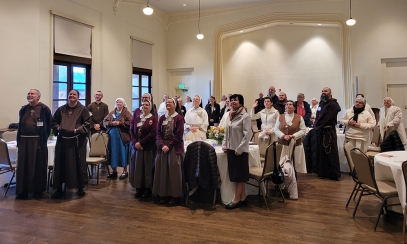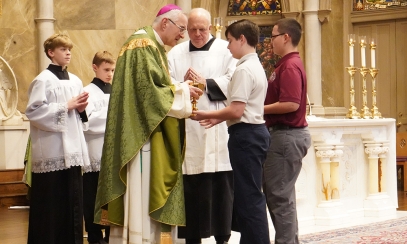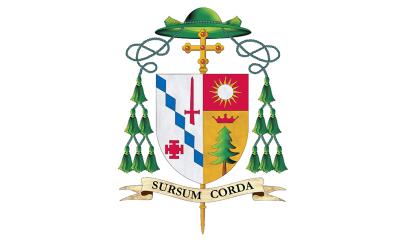
‘His Mercy Endures Forever!’
Divine Mercy 2022
Divine Mercy 2022
On April 24, Bishop Raica celebrated Divine Mercy Sunday with a Holy Hour and the Divine Mercy Chaplet at the Cathedral of St. Paul. The complete text of his homily follows herein.
On April 24, Bishop Raica celebrated Divine Mercy Sunday with a Holy Hour and the Divine Mercy Chaplet at the Cathedral of St. Paul. The complete text of his homily follows herein.
My brothers and sisters in Christ, at this conclusion of the Octave of Easter on this Divine Mercy Sunday, I welcome you to the Cathedral of St. Paul in downtown Birmingham. Every year, the appreciation grows. For many here today, it is something anticipated. We welcome all to the feast of God’s mercy given us by Christ who is risen – truly risen – from the dead. Today reminds us that in one way or another, we are all touched by God’s ineffable mercy.
“Mercy” can also be defined as “steadfast love.” The Psalms give us a reminder of its timeless quality: “His mercy endures forever.” We hear this echoed over and over, like a mantra that should be carried with us all our life. Indeed, that is a source of immense consolation for many – to be touched by mercy! Mercy has some rather beautiful characteristics. One of them, I would say, is an infiniteness – a mercy without beginning and without end. Indeed, as we come to know Jesus, we could easily associate mercy not so much as a value, a noble idea, but rather as a person.
Whenever I experience mercy, I experience Jesus – consoling, comforting, challenging. Mercy is more than pity. Rather, mercy is when one truly cares for another and the ultimate goal or destiny of another, just as the Lord cared for me and is so concerned about my destiny, my future! So, whenever I encounter Jesus, I encounter mercy.
It certainly was true for Peter. He experienced first-hand the mercy of Christ when, after he denied Him, saw Him on the shore cooking some roasted fish. He jumped in the water and swam toward Him. Our Lord didn’t say to him, “Peter, you messed up again!” or “Peter, you dumb cluck!” (He probably thought it few times!) or “Peter, when are you going to get with the program, you’ve been with me for 3 years!” No, He said, “Peter, do you love Me?” What mercy! He goes right to the core of where a person is, not some superficial platitude. “Do you love Me!” The sacrament of penance is like that – we come looking for mercy, for forgiveness, for grace to live, for the chance to belong again and to be a true Son or Daughter of God, to be alive with the presence of Christ! Mercy is most evident and most poignant in the sacrament of penance. To hear those words, “God the Father of mercies, through the death and resurrection of His Son has reconciled the world to Himself!” – I am reconciled with God again and put back in right relationship!
Today, at our Divine Mercy Devotion, we heard the story of mercy: the prodigal son. Here it is – in Chapter 15 of St. Luke’s Gospel – the magnificent “lost and found” department / section! You remember the famous three which crescendos from an inanimate object, to an animate one, to a person: the lost coin, the lost sheep, and the lost son. Let’s just think about that for a moment and how paradoxical Jesus’ approach to it is. The woman who sweeps the house spending inordinate time trying to find a lost coin that was probably part of a head piece of jewelry. Yet, in and of itself, it probably didn’t mean much. Nevertheless, it was seemingly part of her prized piece of jewelry that contributed to her beauty – it meant a lot.
Going to look for the lost sheep risks losing the other 99! They are alone, left alone without protection or security. It is like those who think or assume they are without sin! Finding the lost one is the joy of the shepherd as it is for the one sinner who turns away from sin and toward God.
“It is not the fruit of the one who converts but the fruit of the action of God who seeks the one who is lost. Conversion is always the action of grace given by the Other who puts the lost sheep on His shoulders and goes home.” It is because conversion originates from grace, it needs to be shared. The gospel is not suggesting an either/or – either we are with the 99 or we are the rescued one. One doesn’t have to be lost in order to be found, and being alone doesn’t mean that God is not looking for him or her. It is the action of God, the action of grace and of mercy, that is highlighted here and we, each one of us, is the recipient of this goodness, the mercy, this love!
The prodigal son, in his waywardness, would seem, perhaps, like many today who forsake home and family to embark on the journey of life, trying to create life and relationships anew. Squandering everything he had, he realizes that there’s no place like home. His father cared for him. He messed up and needed to start over again. So, he cautiously makes his way back, even to serve as the farmhand feeding the pigs, an unclean animal for him. He felt like the mud and dirt that the pigs wallowed, and, as it says, when he rehearsed his speech, “didn’t deserve to be called His Son.”
God didn’t send His Son to save the saved but sinners, those who are wounded, hurt, lost, doubting, abandoned, broken, unsettled – those who come to realize they can’t do it on their own. They need a Savior. The Father had been going to the edge of the property watching for any sign that the son would return. Our Father waits for us to come back, saying, “I have sinned … I need Your mercy and forgiveness … I need You and a relationship with You so that I can live again.”
The mercy that we commemorate today began because of the steadfast faith of Sister Faustina Kowalska of Krakow, Poland. Through the appearances of our Lord to her, she began to live this new way of mercy and to promote it, as the Lord had foretold her. Later her bishop, Cardinal Macharski began to promote it in the archdiocese, followed in short order by other Polish dioceses. Then it attracted the attention of Pope St. John Paul II, the former Bishop of Krakow, and he began to promote it and set the date on the Sunday after Easter in accord with the indications our Lord gave to Sister Faustina. As a result, there would be an outpouring of mercy, a great grace given to those who would look at the image of mercy and seek it today. It is an image that reflects the outpouring of mercy with the two fountains that run from the heart of Christ. The white one represents that water, that purifying grace we receive in baptism in washing away original sin and all our sins of the past. It is a mercy that makes us sons and daughters of God. The red fount represents that blood – the Blood of Christ that redeemed us on the cross by which we are washed clean today. It represents that Blood of Christ that typifies the Eucharist which nourishes the Christian faith. It is a mercy that wishes to touch our hurts, our denials, our doubts, our physical wounds, our moral wounds, our spiritual wounds, our psychological wounds, our sins, our anguish, and pain that prevent us from living the fullness of life for which we have been made. Today we seek this grace and love of Christ!
We come seeking God’s mercy, His forgiveness for our sins and transgressions, and the grace to forgive others who may have offended us or have perpetrated some act of injustice against us.
How blessed we are for Thomas, whom we’ve heard proclaimed at Mass today; or Peter who denied our Lord; the prodigal Son; the Good Thief; or the publican in the back of the temple who begged, “Be merciful to me a sinner.” Because of these and the many other examples scattered throughout the Scriptures, we know, “His mercy endures forever!” Jesu, ufam Tobie! Jesus, I trust in You!



